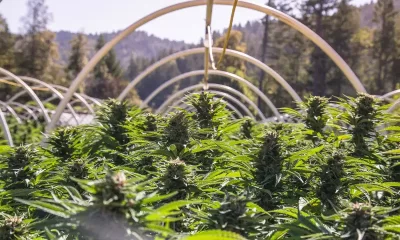Business
California Uses Cannabis Tax Revenue to Grant $35.5 Million to Community Organizations

Cannabis is benefiting California community organizations with this year’s annual cannabis tax revenue grants, which will divide up $35.5 million between 78 different organizations.
The California Governor’s Office of Business and Economic Development (also referred to as GO-Biz) announced on June 1 that it would be granting $35.5 million worth of cannabis tax revenue to community efforts.
The funds come from the California Community Reinvestment Grant program, which will be directed to organizations that help with job placement, mental health treatment, substance use disorder treatment, system navigation services, legal services to address barriers to reentry, and linkages to medical care.
“We’re proud to announce 78 grants totaling $35.5M in awards through the California Community Reinvestment Grants (CalCRG) program. These grants will help serve communities across CA that have been disproportionately impacted by the War on Drugs,” the organization wrote on Twitter.
In a press release, GO-Biz shared the need to use cannabis tax funds for specific communities that are in need of aid. “Harsh federal and state drug policies enacted during that period led to the mass incarceration of people of color, decreased access to social services, loss of educational attainment due to diminished federal financial aid eligibility, prohibitions on the use of public housing and other public assistance, and the separation of families,” the release states.
Furthermore, GO-Biz Director and Senior Adviser to Gov. Gavin Newsom Dee Dee Myers shared a statement regarding the continued success of the program. “Now in its fourth year, the California Community Reinvestments Grants program continues to be an important tool for communities that still face systemic restrictions and barriers to opportunity and equity,” said Myers. “This latest round of awards will support the economic justice and well-being of communities across our state that have been disproportionately impacted by the War on Drugs.”
A total of 78 organizations were chosen across California, located in the counties of Alameda, San Francisco, Los Angeles, Riverside, San Bernardino, San Diego, and more.
Among the recipients receiving the highest amount of $900,000 includes JobTrain, GRID Alternatives Greater Los Angeles, Inc., Community Partners as a fiscal sponsor of Los Angeles Regional Reentry Partnership, and Recovery Café San Jose. Most others, such as the Legal Aid Foundation of Los Angeles, Inland Valley Drug and Alcohol Recovery Services, Kitchens for Good, Inc., will be receiving $450,000.
In 2021, the program sent out 58 grants for a total of $29.1 million and in 2020, $30 million was earmarked for a variety of cities and counties.
Since California legalized adult-use cannabis in 2018, the state has collected $3.76 billion in total tax revenue, according to a press release posted on May 26 by the California Department of Tax and Fee Administration. This includes $1.91 billion from cannabis excise taxes, $467.75 million from cultivation taxes and $1.38 billion from sales taxes.
Recently, Gov. Newsom’s budget proposal set aside $150 million to reduce cannabis taxes. He said in a press statement that the temporary reduction will help aid small cannabis business owners, and also curb illegal sales. “This is [the] beginning of a process from my humble perspective, in terms of my thinking,” Newsom said. “This will be a multi-year process to get that black market, get it on the retreat—not the ascendancy—and to get the retail and responsible adult-use market on steady ground.”
Earlier this year, California announced that it would be granting nearly $100 million to local governments and jurisdictions that would help bolster their cannabis programs, and make them more efficient. The Department of Cannabis Control Director Nicole Elliot explained that this grant money would help communities with specific needs. “Significant funding is being directed to process improvements and environmental assessments, both of which will help the state and local governments achieve short- and long-term goals,” Elliot said. The most highest amount was awarded to the city of Los Angeles for $22,312,360, Humboldt County with $18,635,137, and Mendocino County with $17,586,406.62.
Business
New Mexico cannabis operator fined, loses license for alleged BioTrack fraud

New Mexico regulators fined a cannabis operator nearly $300,000 and revoked its license after the company allegedly created fake reports in the state’s traceability software.
The New Mexico Cannabis Control Division (CCD) accused marijuana manufacturer and retailer Golden Roots of 11 violations, according to Albuquerque Business First.
Golden Roots operates the The Cannabis Revolution Dispensary.
The majority of the violations are related to the Albuquerque company’s improper use of BioTrack, which has been New Mexico’s track-and-trace vendor since 2015.
The CCD alleges Golden Roots reported marijuana production only two months after it had received its vertically integrated license, according to Albuquerque Business First.
Because cannabis takes longer than two months to be cultivated, the CCD was suspicious of the report.
After inspecting the company’s premises, the CCD alleged Golden Roots reported cultivation, transportation and sales in BioTrack but wasn’t able to provide officers who inspected the site evidence that the operator was cultivating cannabis.
In April, the CCD revoked Golden Roots’ license and issued a $10,000 fine, according to the news outlet.
The company requested a hearing, which the regulator scheduled for Sept. 1.
At the hearing, the CCD testified that the company’s dried-cannabis weights in BioTrack were suspicious because they didn’t seem to accurately reflect how much weight marijuana loses as it dries.
Company employees also poorly accounted for why they were making adjustments in the system of up to 24 pounds of cannabis, making comments such as “bad” or “mistake” in the software, Albuquerque Business First reported.
Golden Roots was fined $298,972.05 – the amount regulators allege the company made selling products that weren’t properly accounted for in BioTrack.
The CCD has been cracking down on cannabis operators accused of selling products procured from out-of-state or not grown legally:
- Regulators alleged in August that Albuquerque dispensary Sawmill Sweet Leaf sold out-of-state products and didn’t have a license for extraction.
- Paradise Exotics Distro lost its license in July after regulators alleged the company sold products made in California.
Golden Roots was the first alleged rulebreaker in New Mexico to be asked to pay a large fine.
Source: https://mjbizdaily.com/new-mexico-cannabis-operator-fined-loses-license-for-alleged-biotrack-fraud/
Business
Marijuana companies suing US attorney general in federal prohibition challenge

Four marijuana companies, including a multistate operator, have filed a lawsuit against U.S. Attorney General Merrick Garland in which they allege the federal MJ prohibition under the Controlled Substances Act is no longer constitutional.
According to the complaint, filed Thursday in U.S. District Court in Massachusetts, retailer Canna Provisions, Treevit delivery service CEO Gyasi Sellers, cultivator Wiseacre Farm and MSO Verano Holdings Corp. are all harmed by “the federal government’s unconstitutional ban on cultivating, manufacturing, distributing, or possessing intrastate marijuana.”
Verano is headquartered in Chicago but has operations in Massachusetts; the other three operators are based in Massachusetts.
The lawsuit seeks a ruling that the “Controlled Substances Act is unconstitutional as applied to the intrastate cultivation, manufacture, possession, and distribution of marijuana pursuant to state law.”
The companies want the case to go before the U.S. Supreme Court.
They hired prominent law firm Boies Schiller Flexner to represent them.
The New York-based firm’s principal is David Boies, whose former clients include Microsoft, former presidential candidate Al Gore and Elizabeth Holmes’ disgraced startup Theranos.
Similar challenges to the federal Controlled Substances Act (CSA) have failed.
One such challenge led to a landmark Supreme Court decision in 2005.
In Gonzalez vs. Raich, the highest court in the United States ruled in a 6-3 decision that the commerce clause of the U.S. Constitution gave Congress the power to outlaw marijuana federally, even though state laws allow the cultivation and sale of cannabis.
In the 18 years since that ruling, 23 states and the District of Columbia have legalized adult-use marijuana and the federal government has allowed a multibillion-dollar cannabis industry to thrive.
Since both Congress and the U.S. Department of Justice, currently headed by Garland, have declined to intervene in state-licensed marijuana markets, the key facts that led to the Supreme Court’s 2005 ruling “no longer apply,” Boies said in a statement Thursday.
“The Supreme Court has since made clear that the federal government lacks the authority to regulate purely intrastate commerce,” Boies said.
“Moreover, the facts on which those precedents are based are no longer true.”
Verano President Darren Weiss said in a statement the company is “prepared to bring this case all the way to the Supreme Court in order to align federal law with how Congress has acted for years.”
While the Biden administration’s push to reschedule marijuana would help solve marijuana operators’ federal tax woes, neither rescheduling nor modest Congressional reforms such as the SAFER Banking Act “solve the fundamental issue,” Weiss added.
“The application of the CSA to lawful state-run cannabis business is an unconstitutional overreach on state sovereignty that has led to decades of harm, failed businesses, lost jobs, and unsafe working conditions.”
Business
Alabama to make another attempt Dec. 1 to award medical cannabis licenses

Alabama regulators are targeting Dec. 1 to award the first batch of medical cannabis business licenses after the agency’s first two attempts were scrapped because of scoring errors and litigation.
The first licenses will be awarded to individual cultivators, delivery providers, processors, dispensaries and state testing labs, according to the Alabama Medical Cannabis Commission (AMCC).
Then, on Dec. 12, the AMCC will award licenses for vertically integrated operations, a designation set primarily for multistate operators.
Licenses are expected to be handed out 28 days after they have been awarded, so MMJ production could begin in early January, according to the Alabama Daily News.
That means MMJ products could be available for patients around early March, an AMCC spokesperson told the media outlet.
Regulators initially awarded 21 business licenses in June, only to void them after applicants alleged inconsistencies with how the applications were scored.
Then, in August, the state awarded 24 different licenses – 19 went to June recipients – only to reverse themselves again and scratch those licenses after spurned applicants filed lawsuits.
A state judge dismissed a lawsuit filed by Chicago-based MSO Verano Holdings Corp., but another lawsuit is pending.
Source: https://mjbizdaily.com/alabama-plans-to-award-medical-cannabis-licenses-dec-1/
-

 Business2 years ago
Business2 years agoPot Odor Does Not Justify Probable Cause for Vehicle Searches, Minnesota Court Affirms
-

 Business2 years ago
Business2 years agoNew Mexico cannabis operator fined, loses license for alleged BioTrack fraud
-

 Business2 years ago
Business2 years agoAlabama to make another attempt Dec. 1 to award medical cannabis licenses
-

 Business2 years ago
Business2 years agoWashington State Pays Out $9.4 Million in Refunds Relating to Drug Convictions
-

 Business2 years ago
Business2 years agoMarijuana companies suing US attorney general in federal prohibition challenge
-

 Business2 years ago
Business2 years agoLegal Marijuana Handed A Nothing Burger From NY State
-

 Business2 years ago
Business2 years agoCan Cannabis Help Seasonal Depression
-

 Blogs2 years ago
Blogs2 years agoCannabis Art Is Flourishing On Etsy













